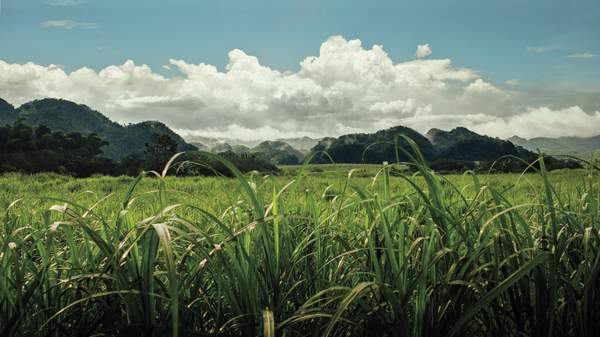Overview
For such a tiny island, Jamaica has had a disproportionate impact on global culture. Naturally, Bob Marley's ubiquitous portrait and defiant, uplifting anthems are the first exports to come to mind. But then there's the rest. It's thanks to Jamaica's 10,911 square kilometres of sundrenched Caribbean goodness that we can gawk at physics-defying athletes, fantasise about encountering Sean Connery or Ursula Andress under a waterfall, and luxuriate in the world's finest coffee and rum.
THE FASTEST MAN IN THE WORLD
One of his legs is a half-inch shorter than the other. During warm ups, when his competitors are stressed to the max, he's usually found dancing. His height measures in at 6 feet, 5 inches — too tall for sprinting, according to convention. And he describes himself as 'lazy'. Against quite a few odds, Usain Bolt, who grew up in a country town in Trelawny, Jamaica, is the fastest man on the planet. At the 2009 World Championships, held in Berlin, he set the current world record for both the 100 metre sprint, at 9.59 seconds, and the 200 metre sprint, at 19.19 seconds.
EVERY JAMES BOND NOVEL YOU’VE EVER READ
In 1946, Ian Fleming bought fifteen acres on a cliff-face on Jamaica’s north coast, built a house and named it Goldeneye. He then wrangled an agreement with his employer, The Sunday Times, which allowed him to take January and February off work. When each new year rolled around, he'd hole himself up in his Caribbean hideaway and write a new James Bond saga. By his death in 1964, twelve novels and two books of short stories were completed. These days, Goldeneye is a fancypants hotel and resort where people like Richard Branson and Harrison Ford hang out.
BLUE MOUNTAIN COFFEE
In Jamaica's Blue Mountains grow some of the most expensive coffee beans you'll find anywhere. Online, they'll set you back $180 a kilogram. They're cultivated in small acreages, between 600 and 1500 metres above sea level, where the moist, cool environment increases the ripening period to as long as ten months. Consequently, the natural sugars within the beans have oodles of time to develop, giving them their famous smooth flavour.
JERK
Finding a local eatery is never difficult to do in Jamaica. That's because the chief national dish, jerk, gives its whereabouts away, as a result of its mouthwatering aroma. Jerk cooking involves rubbing or marinating meat (usually chicken or pork) with a fiery blend of ingredients known as Jamaican jerk spice. Pimento and Scotch bonnet peppers are crucial, but you can also add cinnamon, nutmeg, thyme, cloves, garlic, salt and shallots.
PREMIUM AGED RUM FROM APPLETON ESTATE
When Christopher Columbus visited Jamaica in the 15th century, he brought with him sugarcane and rum. Thanks to the island’s lush climate, some of the finest spirits to ever pass the lips of humankind were soon in production. One such place is Appleton Estate — Jamaica’s oldest sugar estate and distillery — which is located in the heart of Jamaica on an incredible 4,614 hectares in the picturesque Nassau Valley. Appleton Estate has continued their craft in the traditional way, using copper pot and column stills for the distillation process, American oak barrels for ageing and naturally limestone-percolated water from the hills of cockpit country. A master blender then blends the spirit by hand, creating the distinctive flavour profiles and handcrafted feel for which Appleton is renowned. Fun fact: Appleton is one of the few rums in the world that can claim terroir: the unique flavour that only comes from being wholly produced in a single location.
DUNN'S RIVER FALLS
Dunn's River Falls is one of the few waterfalls in the world that you can climb without being in constant fear that you're going to tumble to some horrendous watery death. Even though they're 55 metres high, they're 180 metres long, because they're conveniently shaped like stairs, officially referred to as 'travertine terraces'. In Dr. No (1962), Honey Ryder (Ursula Andress) emerges from the sea at the base of the falls, where she runs into James Bond (Sean Connery).
REGGAE, SKA, DUB, ROCKSTEADY
Bob Marley might be the most legendary of Jamaican musicians, but he's just the start of the record catalogue. Peter Tosh, Jimmy Cliff, and Toots and the Maytals were all raised on the island too. Reggae took hold in the late 1960s, but before that, there was rocksteady, which The Wailers cut their teeth on, and earlier still, ska. With the '70s emerged dub, spearheaded by producers like Lee 'Scratch' Perry and King Tubby.
A WAY OF LIFE THAT ISN'T AN –ISM
Some people have fallen into the habit of describing Rastafari as Rastafarianism, but it's a term that followers don't use — and don't like to hear. That's because they're generally extremely critical of 'isms'. The Rastafari movement kicked off in Jamaica in the 1930s. Rastas worship Haile Selassie I, who was the Ethiopian emperor between 1930 and 1974. They refer to 'conventional society' as Babylon, rejecting what they see as its oppression, consumerism and way too much focus on quashing sensual pleasures.
COOL RUNNINGS
Cool Runnings might have been created by Disney, but its story was inspired by Jamaica and parts of it were shot there. The film hit cinemas in 1993, debuting at box office #3, and was the last movie featuring John Candy released before he passed away. It is (very) loosely based on the real-life experiences of Jamaica's national bobsled team, which made its debut at the Winter Olympics in 1998 at Calgary, Canada.
CIVIL RIGHTS
One of Jamaica's national heroes is civil rights activist Marcus Garvey. He founded the Universal Negro Improvement Association (UNIA) in Jamaica in 1914 before moving to Harlem in 1916. Like Martin Luther King, he was a rousing orator, and spent years travelling across America, attracting thousands and thousands of loyal followers. His major contribution was boosting African Americans' pride in their culture and encouraging their return to their homelands in Africa.
